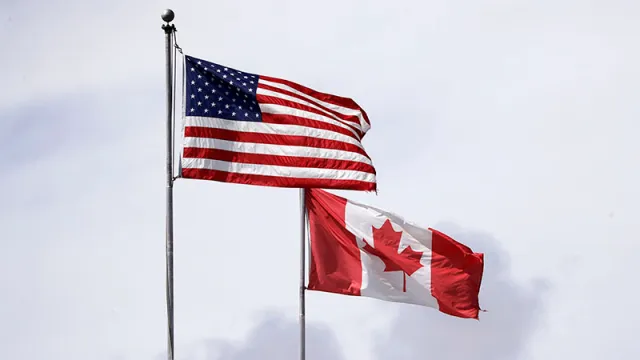Washington, United States — Former U.S. President Donald Trump has intensified his stance on tariffs against Canada, Mexico, and China, citing inadequate efforts in combating fentanyl trafficking. While Trump’s justification is rooted in the ongoing drug crisis, political analysts suggest that his motives extend beyond public health concerns.
Tariffs as a Rapid Policy Tool
According to Joshua Meltzer, a senior fellow at the Brookings Institution, Trump needs a legal rationale to impose tariffs. Declaring a fentanyl-related emergency provides him with a mechanism to enact these measures swiftly, bypassing lengthy trade investigations.
“Fentanyl resonates politically with Trump’s base,” Meltzer told AFP. “Many voters in rural and economically struggling regions are skeptical of trade agreements. Justifying tariffs through the fentanyl crisis aligns with their concerns.”
Tariff Plans and Political Reactions
In February, Trump introduced a broad set of tariffs targeting Canada and Mexico but temporarily suspended their implementation. The pause is set to expire Tuesday, alongside new levies aimed at China. Trump maintains that these tariffs are necessary as illicit drugs continue to enter the United States at what he deems “unacceptable levels.”
However, Canadian Prime Minister Justin Trudeau has refuted these claims, stating that less than one percent of the fentanyl and undocumented migrants entering the United States come through Canada. Trump has dismissed Trudeau’s figures, arguing that Canadian authorities are apprehending only a small fraction of traffickers and need to intensify their efforts.
Fentanyl and U.S. Opioid Crisis
The United States continues to struggle with opioid-related deaths, with tens of thousands of fatalities annually. The latest data for 2023 showed a decline in opioid deaths compared to the previous year, but the crisis remains a key issue for policymakers.
Trump’s Trade Tactics: A Broader Agenda
Kimberly Breier, a former U.S. diplomat under Trump, highlighted that his approach to international relations does not separate trade from other issues.
“Trump integrates various diplomatic and economic concerns into a single strategy,” Breier said. “For instance, the steel and aluminum tariffs imposed in 2018 became leverage in the USMCA negotiations. The same could happen again.”
During his first term, Trump also used tariff threats in immigration policy negotiations. Analysts suggest he is now even more willing to leverage trade penalties to achieve multiple political objectives.
Diverging Views on Protectionism
Former U.S. career diplomat Annie Pforzheimer noted that previous administrations have generally supported free trade.
“Past presidents prioritized stable business relations, avoiding political entanglements that could disrupt economic partnerships,” Pforzheimer said. “This administration, however, adopts a more protectionist approach, showing a willingness to sacrifice free trade for other goals.”
Fentanyl Advocacy Groups Applaud Tariffs
Despite skepticism from trade experts, anti-drug activists support Trump’s crackdown. Andrea Thomas, executive director of Facing Fentanyl, lost her daughter to a counterfeit pill containing fentanyl.
“We’ve long advocated for a whole-of-government response,” Thomas said. “Considering economic measures like tariffs is a new but necessary approach.”
Thomas spearheaded a petition urging economic penalties on China due to its alleged role in fentanyl production. She believes the 10 percent tariff on Chinese goods enacted in February is only the beginning of a larger strategy.
China’s Response and Diplomatic Tensions
China has consistently denied accusations of enabling the fentanyl trade, while Washington insists that Beijing must take more responsibility. The ongoing trade tensions between the two nations complicate diplomatic efforts to curb drug trafficking.
Do Tariffs Work Against Drug Trafficking?
Some experts argue that using tariffs to combat fentanyl is ineffective. A recent Lancet Regional Health – Americas study found that border-based restrictions do little to disrupt sophisticated transnational drug networks. Instead, such measures risk undermining crucial international cooperation.
However, Breier pointed to Trump’s past tariff threats against Mexico, which resulted in increased enforcement actions. Mexico has since extradited 29 alleged drug cartel members, including a suspect linked to the killing of a U.S. agent.
As the tariff pause deadline nears, all eyes are on Trump’s next move. Whether his approach will effectively curb fentanyl trafficking remains to be seen, but the broader political and economic implications are undeniable.
For more in-depth analysis on international trade and political strategies, visit Issue N Fact.

